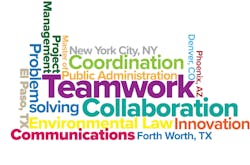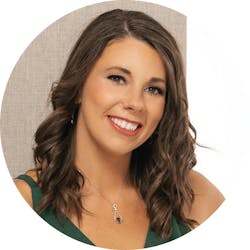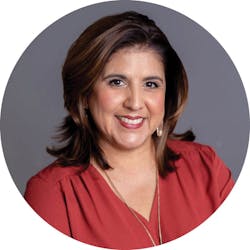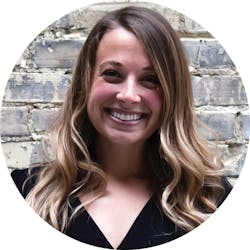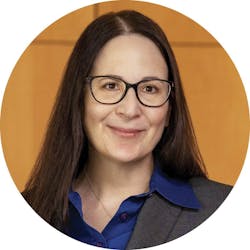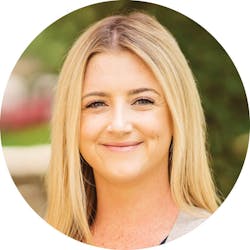In 2024 WaterWorld is pleased to be joining its colleagues in the the Endeavor Business Media water group to feature women in the water industry. From communications and public administration to law and project management, we are highlighting some very special women who contribute to the goal of delivering clean and safe drinking water all across the country.
The passion and insight these women give visibility to may not be gender-specific; as a woman new to the industry, I find the water community to be overall dedicated, enthusiastic and hardworking (with a little humor mixed in) no matter who it is I find myself speaking with. The important thing they demonstrate is a diverse group of humans serving other humans, and hopefully they provide a greater sense of belonging for other women across the varied roles required to tackle the challenging work around life's greatest, most necessary resource: water.
Apply for the fellowship. Send in the nomination. Seek the job promotion.
Chelsea Boozer
MPA Rogue Water Lab
Why Water?
No other profession is so critical to public health, economic development, and quality of life. Water service providers aid in limiting the spread of pandemic diseases. They keep hospitals and schools running. The quality, affordability, and resiliency in water service can recruit businesses to locate in your town and bring with them jobs and tourism. When a community’s water system is healthy and thriving, the community is healthy and thriving.
Empowering, inspiring, and equipping utilities to engage and collaborate with their consumers to bolster public trust so that we can tackle the sector’s infrastructure, workforce, regulatory, and funding issues is honestly a dream job. I love the new possibilities each day to work with partners to make the world a better place through better water.
What advice would you give young women entering the industry?
Always shoot your shot and seek the opportunity. The worst anyone can say is, “No.” Apply for the fellowship. Send in the nomination. Seek the job promotion. Sign up to give the presentation. Ask for the stretch project or extra responsibility. Having initiative can be the variable that sets you apart. Initiative and confidence, paired with competence, can get you anywhere. Getting told, “No” is not that scary, and more often than not you’ll get a “Yes” or alternative. “If not you, then who? If not now, then when?” – Jewish scholar, Hillel the Elder.
What are some challenges you have faced and what are some accomplishments you are most proud of in your career?
I’ve learned that when you’re doing good things, there’s always someone watching to try to bring you down. A quote attributed to Aristotle goes something like, “To avoid criticism: say nothing, do nothing, be nothing.” Little Rock, AR teacher Stacey McAdoo says, “To disrupt and improve harmful systems, courage, conflict, and collaboration are necessary.”
In my work, I’ve been most proud of the impacts that never make the headlines or win the awards. It’s the moments when I help a woman fill out her application for assistance in restoring her water service. Or when I see a town of 250 get their sewer service restored after four years of a nonfunctioning system with overflows. Or when a family is connected to potable water and stop using their contaminated private well due to a project I had a small role in helping get across the finish line. Water workers truly improve lives, and its motivating to see that in action.
“Your contribution is not the scope of your reach. It's the depth of your impact.” – Adam Grant.
What is the most important issue facing the industry to you, and what is your moonshot idea for addressing that issue?
A lack of public trust in water providers is clearly the biggest challenge our sector faces right now. We are working on the solutions to aging infrastructure, regulatory concerns, climate change, workforce, and lack of funding. But we’ll never be able to implement those solutions if the people we serve don’t trust us. To fund and operate sustainable and resilient systems, our consumers must trust we are serving them in their best interest and understand the value they are receiving. We need a revolution in water industry community engagement, communications, and education to bolster public trust. Rogue Water Lab aims to equip, inspire, and empower water providers to do just that.
What piece of media (books, TV shows, movies, games, podcasts, etc.) has had the greatest impact on you the past 12 months?
“The Four Agreements” by Don Miguel Ruiz Jr. I first read it in 2020 but I re-read it at least once a year and have gifted it to more than a dozen people. It changed my entire outlook on life. I’m currently reading “Talk Like Ted,” which is an inspirational look at the science behind effective motivational speaking and equips the reader with the tools necessary to tell stories that connect with an audience and lead to real impact.
The water industry must relate more with our customers when trying to gain their support.
Christina Montoya-Halter
Communications & Marketing Manager, El Paso Water
Why Water?
I feel like water chose me 15 years ago. I did not plan on a career in water, but when the opportunity presented itself, I jumped in … and I’m still swimming 15 years later! I’m truly amazed at the work water utilities do to provide safe and reliable drinking water on demand, 24 hours a day, 7 days a week. I’m honored to be part of a team that is committed to serving our community with a vital resource that we can’t live without.
How did you start your career?
I started my career in water 15 years ago when I decided to leave my job as a journalist at a local TV news station and venture into communications and marketing. I had rarely given a second thought to my tap water, but I saw a job opening at El Paso Water to lead the communications team and it was intriguing. Ed Archuleta was the President and CEO of EPWater at the time, and I’m forever grateful to him for believing in me and giving me the opportunity.
I learned an incredible amount in those early years, and I continue to learn every day. Volunteering on the AWWA Public Affairs Council has added to my learning experience, along with the WateReuse Texas Board where I serve as Vice President.
What about your current position excites you?
When I started in water, communications professionals were few and far between. The team at EPWater was small, but the challenges were growing, and the situation was the same at many utilities across the country. I was able to grow our team at EPWater, and I’ve seen the water industry embrace the importance of communications and outreach. Communications professionals now have a seat at the table, and that’s very exciting.
I’m also leading the outreach efforts for EPWater’s Advanced Water Purification Facility, a project that will transform treated wastewater into safe drinking water for our desert community. It’s a groundbreaking, sustainable project for El Paso and the water industry, and I’m honored to be a part of it.
How do you feel your unique perspective from the role you hold contributes to the biggest issues facing the water industry?
I’m not an engineer or a scientist, but I have the perspective of a customer, and that’s important when you are trying to earn their trust. My non-technical mind helps when I’m tasked with explaining our projects and treatment processes to our customers. The water industry must relate more with our customers when trying to gain their support.
What piece of media (books, TV shows, movies, games, podcasts, etc.) has had the greatest impact on you the past 12 months?
As a former journalist I was enthralled with The Morning Show series on Apple TV. The last season provided honest commentary on the state of the news media today and made me think about the future of journalism in our country. I do value the work of good journalists, and I think we need them to stay informed.
Up until about age seven, I was convinced I was a mermaid.
Megan McDowell
Senior Communications Specialist American Water Works Association
Why Water?
Up until about age seven, I was convinced I was a mermaid. So, you could say I’ve been in love with the world of water from a young age. I also grew up on a peninsula – in Door County, Wisconsin – and spent the first 18 years of my life surrounded by water and a local community that loved and protected its environment.
To borrow from our tagline at AWWA, water is our most vital resource on the planet, and I am honored to be working in an industry that is so important to human life.
How did you start your career?
With a B.A. in English literature and an obsession with food (especially cheese), I landed my first job out of college with a marketing agency known for their work with food and beverage clients. I learned the ropes of PR and strategic communications by working with cheese companies and other food brands.
A few years later, I found myself working at a PR firm in Milwaukee whose client roster included a water technology company. I was immediately drawn to everything about the water sector. I am amazed by the passionate, dedicated and kind people in this industry and the incredible impact of their work. I knew I had to be part of it.
What about your current position excites you?
I seriously love my job. When leading campaigns like Drinking Water Week and Source Water Protection Week, I get to flex my creative muscles while raising awareness about crucial issues. Finding fresh, engaging ways to communicate the value of water to diverse audiences – from consumers to water professionals to policymakers – keeps me constantly on my toes. I also feel so lucky to work with and learn from my incredible colleagues at AWWA. Working alongside such dedicated individuals creates a truly collaborative and inspiring environment.
What is a part of your role you think most people don’t realize?
Most people might not realize that water communicators wear many hats. We juggle scientific jargon with everyday language, distilling complex technical processes into relatable stories for diverse audiences. It's a constant learning journey, requiring us to stay curious and explore various topics – from treatment processes to conservation tips. While we don't claim to be engineers ourselves, we strive to understand the "why" behind the "how" to effectively communicate the value of water.
What do you wake up excited to do on days off?
I moved to Denver, Colorado, about a year ago, and I am loving all the outdoor adventures waiting for me every weekend. I wake up excited on the weekends to go hiking in the mountains with my boyfriend, Andrew, and my dog, who is a corgi named Maisie. When I’m not exploring the Rocky Mountain wilderness, I love finding new recipes to cook, reading novels, and checking out the local restaurant scene with friends.
It requires a lot of work, both on and off the clock, to stay current with all of the changes impacting the water industry.
Stephanie Feingold
Partner at Morgan Lewis
Why Water?
Water is arguably our most precious natural resource. Providing universal access to clean water is one of the most significant challenges we face, not only as a nation, but as a planet. Growing up in Southern California, which was almost always in some phase of a drought, impressed upon me the importance of protecting and conserving this limited resource.
How did you start your career?
I chose the practice of law because I wanted to find a way to advance my interest in environmental issues, but didn’t have a technical degree. Being a lawyer has enabled me to help the regulated industry understand and comply with the regulatory requirements associated with our nation’s water resources. I started my legal career with an internship at an NGO, intending to help promote policy changes, but then moved into private practice where I could have more immediate impacts on a broader array of clients.
What about your current position excites you, and what are some accomplishments you are most proud of in your career?
I love that my current position affords me with the opportunity to speak to groups of both legal and technical professionals and (hopefully) educate them about something that they didn’t know going into the presentation. One of the most rewarding experiences that I had recently was speaking on an ABA panel on recent developments in drinking water regulation in the US, where a number of people came up to me afterwards to let me know how interesting and informative my talk was.
What is a part of your role you think most people don’t realize?
It requires a lot of work, both on and off the clock, to stay current with all of the changes impacting the water industry. But I am happy to invest the time and energy, because these are issues that are both interesting and extremely important. I also rely heavily on the various technical consultants with whom I work to help me identify solutions to problems as they arise.
What do you wake up excited to do on days off?
On my days off, I love sleeping in a bit, lingering over my coffee while I catch up on the week’s news, strolling to my local farmers’ market for some fresh produce and baked goods, and then getting in some stretching and meditation at my yoga class. When the weather is nice, I visit my nearby state park for a walk or run, where I can enjoy stunning views of the NY City skyline across New York Harbor. The sound of the water lapping against the jetties is always soothing, and it never ceases to amaze me how much peace can be found along the water in the middle of an urban environment.
It takes an innovative mindset willing to troubleshoot in order to be successful in the water sector.
Taylor Meulemans
Project Manager, McCarthy Building Companies
Why Water?
I was a Global Studies major in college. Initially, I didn’t really know a career in water was an option. However, after an internship with a heavy civil contractor that did a lot of water work, I realized there is something very special about this sector – I felt called to be working in the area and being part of making this important natural resource available to communities.
I’ve found the complicated projects and collaborative work very exciting, and I truly enjoy working through the unique issues and challenges that each water project brings. The high degree of problem-solving, which is specific to water project design and construction, is exciting to work through and knowing that we are impacting so many lives makes each day incredibly rewarding.
How did you start your career?
I transitioned to McCarthy two years after I graduated college. McCarthy has always had a great reputation, and I knew it would be worthwhile to take the opportunity to work for a well-respected, integrated team committed to delivering reliable water infrastructure to our communities.
Along my journey, I’ve been really lucky to have some strong mentors both inside and outside of McCarthy who have helped me along the way. I strive to be a good example to other women who might be interested in joining the water sector and advocate for people who are new in their careers like others did for me.
What role has mentorship played in your career to date?
There are so many great examples of women in construction in the water business at McCarthy. On the project I’m working on now for Johnson County in Kansas, there are six other women leaders in operations and safety alone. We also have a large group of very smart women leading the firm’s design integration team that’s focused on water.
One of my mentors is Kim Young, another project manager at McCarthy, who has helped me navigate through the world of construction as a female. She has shared lessons learned about the challenges she faced, which has helped empower me, and showed me how and when to lean in and when to stand back and observe.
What are some challenges you have faced?
I don’t think people realize how much coordination goes on into the day-to-day operations of working on a water or wastewater project. We pride ourselves on being “certainty providers” that deliver the best value by doing what’s right, not what’s easiest. There is a high level of internal coordination involved.
I’m on the process team, which includes our self-perform work package, but we also coordinate with all the subcontractors, vendors, owners and engineers. All of these different parts of a puzzle have to fit together, and there are challenges that come up every day. We are committed to innovation and empowering each other to allow the best solutions to rise to the top.
Right now, I’m on an active wastewater plant that has to stay in operation for the entire duration of the project. We have weekly meetings with the engineers and owners so when we are executing each of the 35 planned maintenance of plant operations (MOPOs), we don’t end up with any unplanned interruptions. It takes an innovative mindset willing to troubleshoot in order to be successful in the water sector.
What are some accomplishments you are most proud of in your career?
Fostering a people-focused, highly collaborative team environment on the projects that I’m a part of will always make me most proud. Genuine connection, culture and shared goals are what leads to honors like the “Best of the Best” that we recently received from ENR in the Water Environment category for the last project I worked on, which was the $268 million expansion of the Johnson County Tomahawk Creek Wastewater Treatment Facility in Kansas.
What is a part of your role you think most people don’t realize?
I don’t think people realize the intense level of collaboration and coordination of construction activities that take place. People think, “Oh you’re a project manager so you punch in numbers and push a schedule,” but so much more goes into my job from a teaming aspect. Also, with the Water sector, you’re never done learning. The technology is constantly evolving, and our projects require an integrated approach across functions with numerous stakeholders in order to deliver reliable water infrastructure to our communities.
What do you wake up excited to do on days off?
I have a Golden Retriever named Koda, and I enjoy taking him on walks. I also like Pilates; traveling, including frequent visits to my home state of Arizona; spending time with my fiancé and planning for our wedding, which will take place in April, 2025.
About the Author
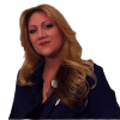
Mandy Crispin
Mandy Crispin is the editor-in-chief of WaterWorld magazine and co-host of water industry podcast Talking Under Water. She can be reached at [email protected].
